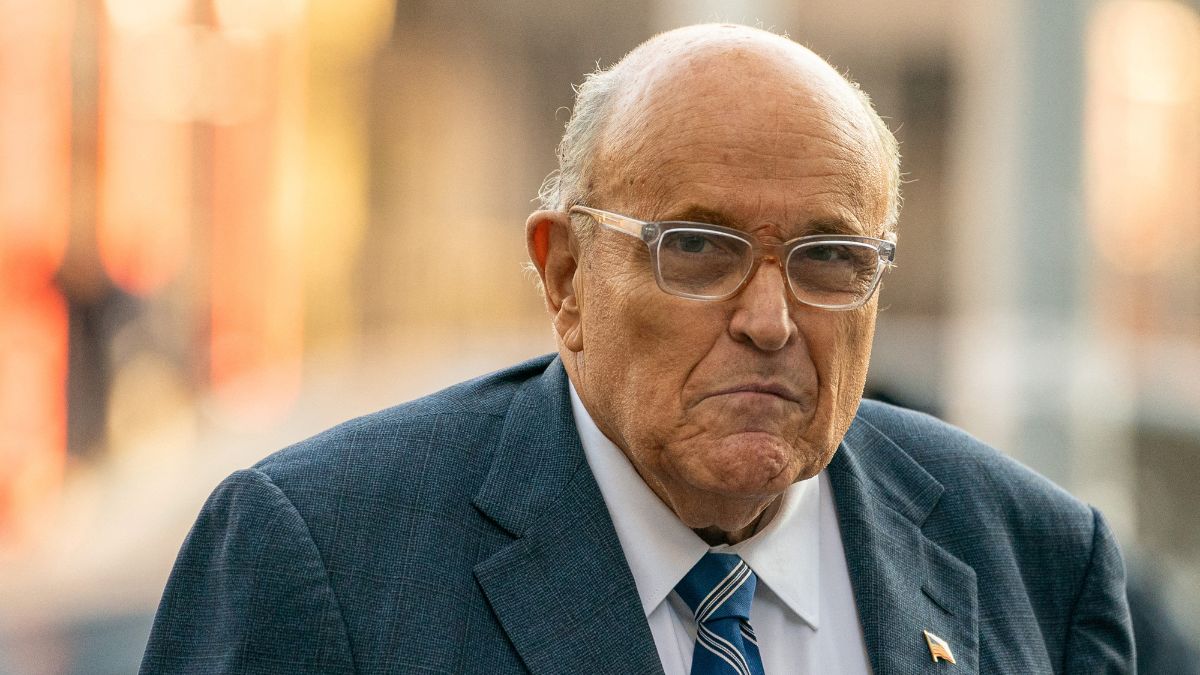United States President Donald Trump on Monday announced that he would present Rudy Giuliani, the former mayor of New York City and his longtime ally, with the Presidential Medal of Freedom.
The declaration came only two days after Giuliani was involved in a serious car crash in New Hampshire.
His spokesperson, Michael Ragusa, confirmed that the rental vehicle Giuliani was traveling in was struck from behind at high speed, leaving him with a fractured vertebra and multiple injuries.
Ragusa said Giuliani was “in good spirits and recovering tremendously” and later clarified that the incident was “not a targeted attack.”
In a statement made on Truth Social, Trump lauded Giuliani, describing him as “the greatest Mayor in the history of New York City, and an equally great American Patriot.”
He also said that “details as to time and place to follow,” indicating that the medal ceremony’s schedule would be announced at a later stage.
The Presidential Medal of Freedom is the highest civilian recognition in the United States, awarded to individuals who have made notable contributions to the prosperity, values, or security of the nation, to world peace, or to other areas of public or private achievement.
For Trump, the decision to honour Giuliani highlights their political partnership, but it has resulted in a divide because of Giuliani’s long trail of legal troubles and public controversies over the last decade.
Editor’s Picks
When Giuliani became “America’s Mayor”
Rudolph William Giuliani, born in Brooklyn in 1944, rose to prominence as a federal prosecutor in the 1980s, becoming known for his aggressive use of the Racketeer Influenced and Corrupt Organisations Act (Rico) to take on organised crime and white-collar criminals.
By the time he became mayor of New York City in 1994, Giuliani had already cultivated a reputation as a tough and combative law-and-order figure.
As mayor, Giuliani served two terms until 2001. His administration was credited with reducing crime rates, though critics argued that his policies often came at the expense of civil liberties and disproportionately affected minority communities.
His combative style as mayor earned him both staunch supporters and harsh detractors.
Giuliani’s defining moment came on September 11, 2001, when hijacked planes crashed into the World Trade Center, killing nearly 2,800 people in New York. His leadership during the crisis drew widespread praise.
He walked the streets near Ground Zero, coordinated rescue and recovery operations, and served as a public face of the city’s resilience. The global acclaim that followed led to him being nicknamed “America’s Mayor.”
He was named Time magazine’s Person of the Year in 2001 and received an honourary knighthood from UK’s Queen Elizabeth II.
Many suggested he should remain in office for a third term, but city law prevented it, and Giuliani stepped down in December 2001.
When Giuliani allied with Donald Trump
Following his mayoralty, Giuliani entered the private sector, establishing a consulting firm that reportedly earned $100 million in its first five years.
He also pursued national politics, launching an unsuccessful bid for the Republican presidential nomination in 2008. His campaign struggled, and he eventually withdrew.
Giuliani’s political trajectory changed with the rise of Donald Trump. An early and vocal supporter of Trump’s 2016 presidential campaign, Giuliani became one of his most trusted allies.
After Trump’s victory, Giuliani was considered for senior posts in the administration, including US secretary of state, though he did not receive the role.
Instead, he served as an unofficial adviser on cybersecurity and later joined Trump’s personal legal team during Robert Mueller’s special counsel investigation into Russian interference in the 2016 US election.
Although Giuliani made frequent television appearances defending Trump, some of his remarks were considered counterproductive. Nonetheless, he remained one of Trump’s most loyal defenders.
His role expanded during Trump’s first impeachment in 2019, when Giuliani’s back-channel dealings with Ukrainian officials came under scrutiny.
He was accused of pressuring Ukraine to launch investigations into Joe Biden, then a political rival of Trump. These activities made him a central figure in the impeachment proceedings, though Trump was acquitted by the Senate in early 2020.
When Giuliani fell from grace
After Joe Biden defeated Trump in the 2020 US presidential election, Giuliani became the public face of Trump’s efforts to challenge the results. He filed lawsuits across multiple states alleging widespread voter fraud, though none of the claims were substantiated in court.
In Georgia, Giuliani made repeated false claims to lawmakers about supposed irregularities, later admitting that his accusations against two election workers in the state were defamatory.
One of his most notorious appearances during this period was a press conference at Four Seasons Total Landscaping in Philadelphia — mistakenly believed at first to be at the luxury hotel of the same name — situated next to a crematorium and an adult entertainment store.
The unusual setting quickly became the subject of ridicule.
Another widely circulated incident occurred when dark streaks, believed to be hair dye, ran down Giuliani’s face during a press briefing.
These moments contributed to his transformation from a respected former mayor into a frequent subject of late-night satire and internet memes.
Giuliani also spoke at the January 6, 2021 rally preceding the violent assault on the US Capitol. In front of Trump supporters, he called for “trial by combat.”
The New York State Bar Association condemned his words as intended to encourage violence, and he later claimed they were “hyperbolic.”
How Giuliani’s legal troubles mounted
Giuliani’s legal challenges mounted in the years following the 2020 election. Dominion Voting Systems sued him for defamation after he claimed its voting machines were rigged.
His law licenses were suspended in both New York and Washington, DC, after courts concluded he had made false and misleading statements to lawmakers, judges, and the public.
His financial struggles also became increasingly visible. Giuliani faced expensive lawsuits, a costly third divorce, and accusations of unpaid debts. His ex-wife Judith claimed he owed her more than $260,000 in a dispute that nearly resulted in jail time.
A former employee sued him for nearly $2 million in unpaid wages and alleged he coerced her into sexual encounters, allegations Giuliani denied.
In 2023, Giuliani was indicted in Georgia under the state’s Rico law for his alleged role in attempting to overturn Biden’s election victory. The irony of being charged under the same law he once used as a prosecutor against mobsters and corporate criminals was not lost on observers.
Giuliani denounced the indictment, declaring it “an affront to American democracy” that did “permanent, irrevocable harm to our justice system.”
On his radio programme, he called the case “an atrocity” and “an out and out assault on the First Amendment.”
Giuliani was also processed in 2024 in the criminal case over the effort to overturn Trump’s Arizona election loss to Biden.
Despite his legal woes, Giuliani continued to maintain a presence in conservative circles. He hosted a daily radio show and ran an online streaming program titled “America’s Mayor Live,” though his audience was limited.
To raise money, he sold autographed 9/11 shirts for $911, promoted products from Trump ally Mike Lindell, and offered personalised videos on Cameo for $325 each.
In 2023, he listed his Manhattan apartment for $6.5 million.
How 9/11 Giuliani is strikingly different from present-day Giuliani
The announcement that Giuliani will be awarded the Presidential Medal of Freedom highlights the strikingly different perceptions of his legacy.
Supporters, especially among conservatives, continue to see him as a patriot who stood by Trump and as the figure who guided New York through its darkest hour after 9/11.
However, critics argue his more recent actions overshadow his earlier achievements. Hamilton “Phil” Fox III, who led the disbarment case against him had observed at the time, “It’s like there are two different people. I don’t know if something happened to Mr. Giuliani or what.”
Donna Lieberman of the New York Civil Liberties Union had offered an even sharper critique, “Just because he was the face of a devastated and pained city after 9/11 doesn’t mean that he wasn’t still the authoritarian, anti-democratic bully” she said characterised most of his tenure as mayor.
Professional bodies have also moved against him. The DC Bar Association panel in 2023 had concluded his conduct went beyond poor judgement, writing that his actions “sadly transcend all his past accomplishments.”
Also Watch:
The Presidential Medal of Freedom has historically been awarded to individuals who have made lasting contributions to American society, including leaders, activists, scientists and cultural figures.
With inputs from agencies
End of Article

)

)